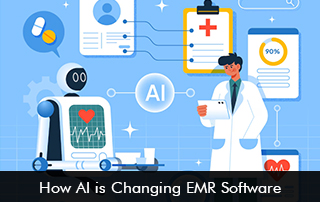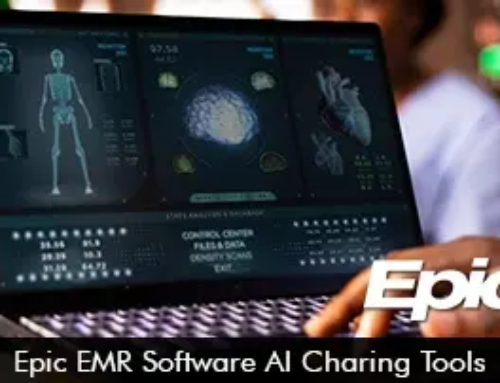EMR software has revolutionized healthcare by digitizing patient records, improving accessibility, and streamlining workflows. However, traditional EMR systems often struggle with inefficiencies, data overload, and usability challenges. Enter Artificial Intelligence (AI)—a game-changing technology that is transforming EMR software into a smarter, more intuitive, and highly efficient tool.
From automating documentation to predicting patient outcomes, AI is enhancing EMR systems in unprecedented ways. In this blog, we’ll explore how AI is reshaping EMR software, the benefits it brings to healthcare providers, and the future of AI-powered medical records.
1. Automating Clinical Documentation
One of the biggest pain points for healthcare providers is the time-consuming task of manual documentation. Physicians spend nearly 50% of their workday entering data into EMRs, leading to burnout and reduced patient interaction.
How AI Helps:
-
Voice Recognition & NLP: AI-powered speech-to-text tools (like Nuance Dragon Medical) allow doctors to dictate notes naturally, converting speech into structured EMR entries.
-
Smart Charting: AI can auto-populate fields by extracting relevant data from past records, lab results, and even real-time conversations.
-
Ambient Clinical Intelligence (ACI): Companies like Suki.AI and Augmedix use AI to listen to doctor-patient conversations and generate notes automatically, reducing administrative burden.
Impact:
-
Faster documentation (reducing time spent on notes by 50-70%).
-
Fewer errors (AI reduces typographical and missing data errors).
-
More face-to-face patient care.
2. Enhancing EMR Software Clinical Decision Support (CDS)
EMRs contain vast amounts of patient data, but manually analyzing this information for diagnoses and treatment plans is overwhelming. AI-powered Clinical Decision Support Systems (CDSS) help physicians make faster, evidence-based decisions.
How AI Helps:
-
Predictive Analytics: AI analyzes patient history, lab results, and trends to flag potential risks (e.g., sepsis, heart failure).
-
Drug Interaction Alerts: AI cross-references medications to prevent harmful combinations.
-
Personalized Treatment Plans: Machine learning models suggest tailored therapies based on similar patient cases.
Impact:
-
Early disease detection (e.g., AI can predict diabetic complications before symptoms appear).
-
Reduced misdiagnoses (IBM Watson Health has shown 90% accuracy in cancer diagnosis support).
-
Improved adherence to best practices (AI reminders for vaccinations, screenings).
3. Improving EMR Software Interoperability & Data Integration
Healthcare systems often use different EMR platforms (Epic, Cerner, Meditech), making data sharing difficult. AI helps bridge these gaps by standardizing and interpreting data across systems.
How AI Helps:
-
Natural Language Processing (NLP) extracts unstructured data (doctor’s notes, PDFs) and converts it into structured formats.
-
AI-powered FHIR APIs enable seamless data exchange between hospitals, labs, and pharmacies.
-
Blockchain + AI ensures secure, decentralized patient records while maintaining data integrity.
Impact:
-
Better care coordination (e.g., ER doctors accessing a patient’s full history instantly).
-
Reduced duplicate tests (AI identifies prior imaging/lab results).
-
Enhanced population health management (AI aggregates data for public health insights).
4. Streamlining Revenue Cycle Management (RCM)
Billing and coding errors cost the U.S. healthcare system $262 billion annually. AI is optimizing revenue cycles by automating claims processing and reducing denials.
How AI Helps:
-
Automated Coding: AI (like Fathom Health) reviews clinical notes and assigns accurate billing codes (ICD-10, CPT).
-
Denial Prediction: Machine learning identifies claims likely to be denied and suggests corrections before submission.
-
Fraud Detection: AI flags suspicious billing patterns, reducing healthcare fraud (estimated at $100B/year).
Impact:
-
Faster reimbursements (AI reduces claim processing time by 30-40%).
-
Higher accuracy (AI reduces coding errors by 50%).
-
Lower administrative costs (hospitals save millions in denied claims).
5. Enhancing Patient Engagement & Remote Monitoring
Modern EMRs are no longer just for doctors—they empower patients through AI-driven portals and telehealth integrations.
How EMR Software AI Helps:
-
Chatbots & Virtual Assistants: AI-powered chatbots (like Sensely) answer patient queries, schedule appointments, and provide medication reminders.
-
Remote Patient Monitoring (RPM): AI analyzes wearable device data (Fitbit, Apple Watch) to alert doctors of anomalies (e.g., irregular heartbeats).
-
Personalized Health Insights: AI gives patients tailored wellness recommendations based on their EMR data.
Impact:
-
Better patient adherence (AI reminders improve medication compliance by 20%).
-
Reduced hospital readmissions (RPM cuts heart failure readmissions by 50%).
-
More proactive care (AI detects early warning signs before emergencies).
6. Addressing EMR Software Security & Compliance Challenges
EMRs are prime targets for cyberattacks (healthcare breaches cost $ 10 M+ per incident). AI strengthens security while ensuring HIPAA compliance.
How EMR Software AI Helps:
-
Anomaly Detection: AI monitors login patterns and flags suspicious access (e.g., unauthorized EHR views).
-
Automated Audits: AI tracks every EMR interaction, ensuring compliance with regulations.
-
Encrypted AI Models: Federated learning allows AI to analyze data without exposing raw records.
Impact:
-
Fewer data breaches
-
Better patient privacy
-
Easier compliance reporting
The Future of AI in EMR Software
AI’s role in EMRs is just beginning. Future advancements may include:
- AI-generated progress notes
- Genomic EMR integration
- Augmented Reality (AR) charting
Conclusion
AI is transforming EMR software from a static digital record into a dynamic, intelligent healthcare assistant. By automating documentation, improving decision-making, enhancing interoperability, and boosting security, AI is making EMRs more efficient and patient-centric than ever before.
Healthcare providers who embrace AI-powered EMRs will benefit from reduced burnout, higher accuracy, and better patient outcomes, paving the way for a smarter, more connected healthcare future.
Are you using an AI-enhanced EMR? What changes would you like to see next? Let us know in the comments!








